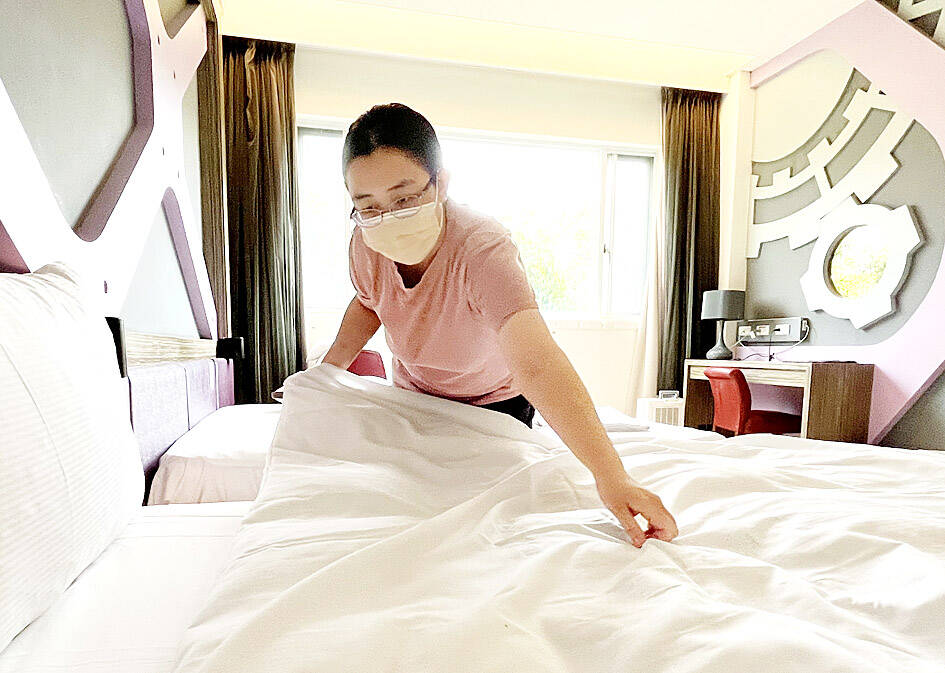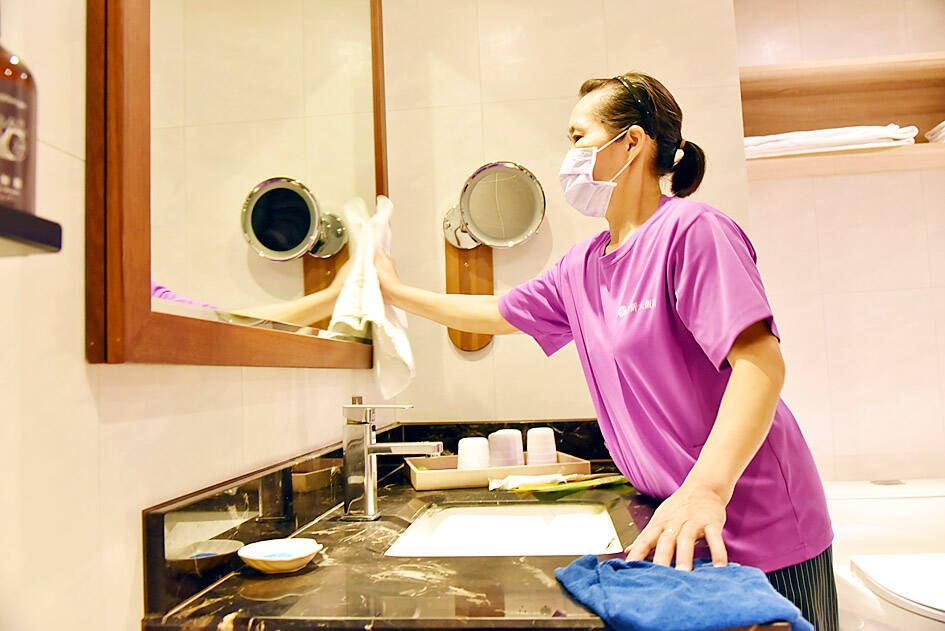Hoteliers and accommodation service providers could soon begin hiring foreign workers for housekeeping positions after the Executive Yuan voiced its conditional support for such a policy, the Tourism Administration said yesterday.
Details of the new policy are to be announced by the Ministry of Labor, Tourism Administration Director-General Chou Yung-hui (周永暉) said, adding that trial operations could start in the second half of this year.
Taiwan currently only allows foreigners to work in the construction industry or as domestic caregivers. Chou’s statement marks a significant change in the government’s position on recruiting foreign workers, as the labor ministry had previously rejected the Tourism Administration’s proposal to hire housekeeping workers from overseas.

Photo courtesy of the Workforce Development Agency’s Yunlin-Chiayi-Tainan Regional Branch
Instead, the agency was advised to persuade local hoteliers to raise the wages of housekeeping staff and prioritize hiring domestic workers.
Chou said that the labor ministry’s position on recruiting and protecting domestic workers first, including ensuring the right of employment for women and middle-aged and senior workers, remains unchanged.
The labor ministry “would set conditions for hiring foreign workers, which we would discuss with the Hotel Association of the ROC [Republic of China]. If the conditions are considered feasible, we would follow those conditions and start trial operations in the next six months,” Chou said.

Photo: Wang Chun-chung, Taipei Times
Premier Chou Jung-tai (卓榮泰) has indicated his support for allowing hoteliers to recruit foreign workers under certain conditions, Chou added.
Meanwhile, hotels can continue to employ international students and ethnic Chinese students in Taiwan as service personnel, with their duration of stay extended to one to two years, up from six months to one year, Chou said.
Asked about qualifications, Chou said foreign hotel workers must be able to communicate in English and Mandarin.
Separately, Minister of Transportation and Communications Chen Shih-kai (陳世凱) said that the nation still aims to attract 10 million international visitors this year.
As of May 5, Taiwan had logged 3.5 million international tourist arrivals.
The New Taiwan dollar’s sharp appreciation against the greenback presents a challenge to attracting international tourists, as it has increased their travel costs to Taiwan, Chen said.
The ministry would press on despite the challenge, he said.
“We hope to identify more tourism highlights to draw foreign travelers, not just Sun Moon Lake, Taroko Gorge and Alishan. We also hope that they increase their spending in Taiwan, such as combining tourism and aesthetic medicine,” he said.

The manufacture of the remaining 28 M1A2T Abrams tanks Taiwan purchased from the US has recently been completed, and they are expected to be delivered within the next one to two months, a source said yesterday. The Ministry of National Defense is arranging cargo ships to transport the tanks to Taiwan as soon as possible, said the source, who is familiar with the matter. The estimated arrival time ranges from late this month to early next month, the source said. The 28 Abrams tanks make up the third and final batch of a total of 108 tanks, valued at about NT$40.5 billion

A group from the Taiwanese Designers in Australia association yesterday represented Taiwan at the Midsumma Pride March in Melbourne. The march, held in the St. Kilda suburb, is the city’s largest LGBTQIA+ parade and the flagship event of the annual Midsumma Festival. It attracted more than 45,000 spectators who supported the 400 groups and 10,000 marchers that participated this year, the association said. Taiwanese Designers said they organized a team to march for Taiwan this year, joining politicians, government agencies, professionals and community organizations in showing support for LGBTQIA+ people and diverse communities. As the first country in Asia to legalize same-sex

MOTIVES QUESTIONED The PLA considers Xi’s policies toward Taiwan to be driven by personal considerations rather than military assessment, the Epoch Times reports Chinese President Xi Jinping’s (習近平) latest purge of the Chinese People’s Liberation Army (PLA) leadership might have been prompted by the military’s opposition to plans of invading Taiwan, the Epoch Times said. The Chinese military opposes waging war against Taiwan by a large consensus, putting it at odds with Xi’s vision, the Falun Gong-affiliated daily said in a report on Thursday, citing anonymous sources with insight into the PLA’s inner workings. The opposition is not the opinion of a few generals, but a widely shared view among the PLA cadre, the Epoch Times cited them as saying. “Chinese forces know full well that

Travel agencies in Taiwan are working to secure alternative flights for travelers bound for New Zealand for the Lunar New Year holiday, as Air New Zealand workers are set to strike next week. The airline said that it has confirmed that the planned industrial action by its international wide-body cabin crew would go ahead on Thursday and Friday next week. While the Auckland-based carrier pledged to take reasonable measures to mitigate the impact of the workers’ strike, an Air New Zealand flight arriving at Taipei from Auckland on Thursday and another flight departing from Taipei for Auckland on Saturday would have to